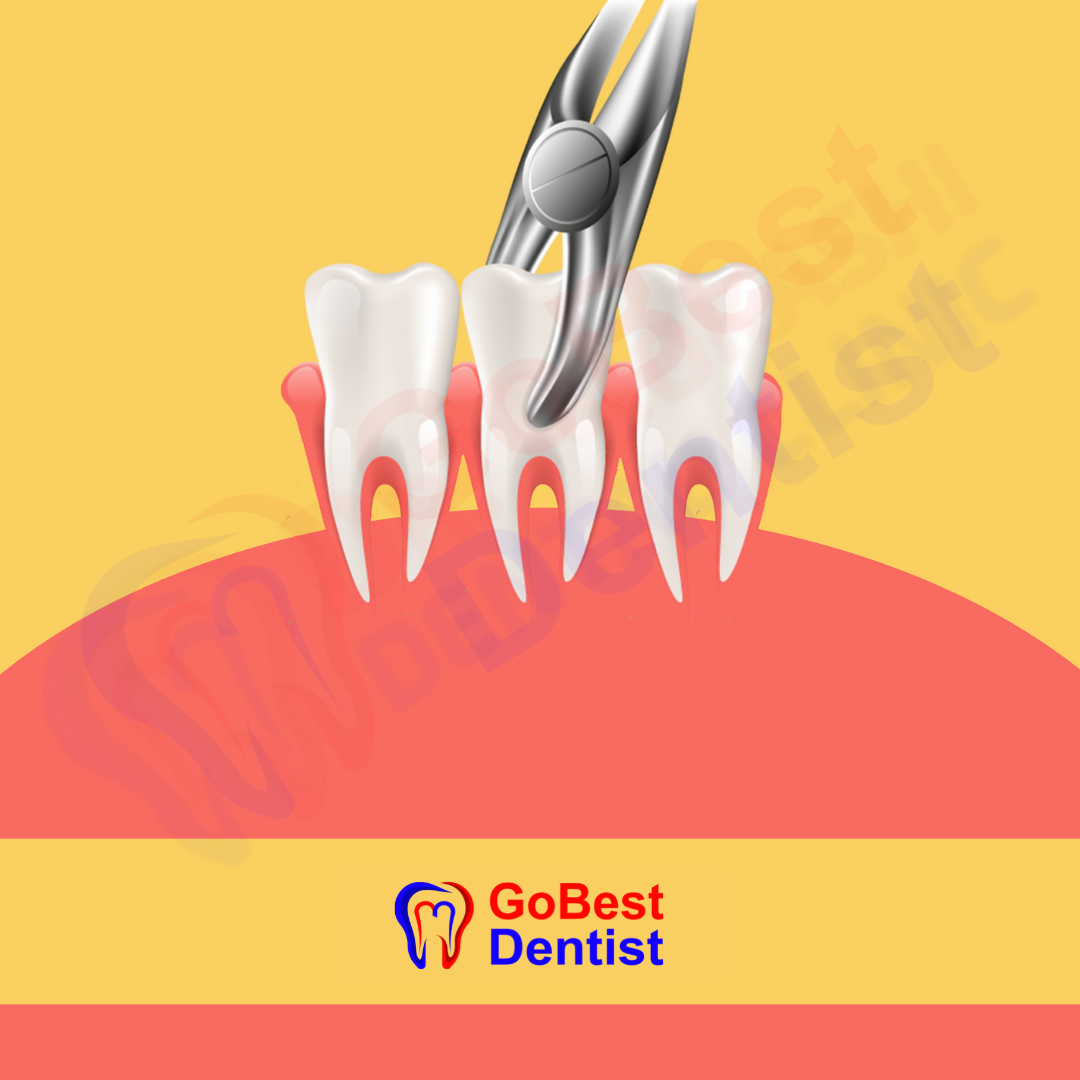TOOTH EXTRACTION TREATMENT
‘If the dentist at GoBest Dentist are asking you for extraction, trust us it is the last resort.’
When
When do I require my teeth to get extracted?
At GoBest Dentist, we try our best to save your teeth by any possible means we can. But there are some conditions which inadvertently requires your tooth to be removed.
These conditions are as follows:
- Excessively decayed teeth which cannot be saved by Root canal treatments.
- Tooth infection.
- Before orthodontic treatment in case of severe crowding.
- Periodontally compromised/Mobile teeth.
- Impacted wisdom teeth.
In addition to the above mentioned causes, a person who has to undergo a chemotherapy or an organ transplant, may require removal of teeth that can cause problem. This is because we cannot perform any extraction till a minimum of 6 months after a chemotherapy.
Looking for a painless tooth extraction in Pune?
CONTACT US

TYPES
What are the types of tooth extraction
The type of method used for tooth extraction depends on the amount of grip available for a dentist to hold and remove the tooth.
SIMPLE EXTRACTION
If your tooth is completely visible and easily accessible, we might choose a simple extraction procedure for you. We will give local anesthesia to numb the concerned area so that you do not feel any pain during the procedure. You might feel a little pressure and that is totally normal.
In case of simple extraction, we may require simple instruments like elevators and forceps. Elevators are used to gently rock the tooth in order to make it mobile in the socket. This will ensure an easy removal. Forceps are then used to catch the tooth and gently remove them entirely from your mouth.
In most cases, simple extraction does not require sutures but this is not a thumb rule. Also in some cases the teeth may break into small pieces during the process of removal. In such a case, a simple tooth extraction may turn into a surgical one.
SURGICAL EXTRACTION
There are some tooth which are a little complicated in terms of removal. Such teeth requires certain additional steps then the one mentioned in simple extraction procedure.
When the tooth is not easily accessible, we may require to make a small incision into your gum tissue before applying elevators or forceps to them. If the bone is deeply embedded into the bone, we may need to trim a little bone to reach to the tooth and cut your tooth into pieces to ensure complete removal.
- The following conditions may require a surgical extraction:
- Broken tooth
Sometimes only a small portion of your tooth is visible in the oral cavity. This might be difficult for us to grasp the fragment with the instrument and remove it. - Brittle tooth
Dental caries can weaken the tooth structure and make it brittle. Such teeth might seem to be intact but they tend to break when we try to hold them with the instrument. This might also happen in case of a traumatized tooth which might contain invisible fractures. - Extremely curved tooth root
Some teeth may have excessive curvatures in the root portion. Trying to forcefully remove them without making proper excess may lead to fracture of jaw bone. - Impacted tooth
Sometimes a tooth may be so deeply embedded under the soft tissue or bone that it is impossible for it to get erupted up to its normal occlusal level. - All of the above mentioned cases are easily removed by adding small steps to a simple extraction procedure.
Worried about pain? Get best tooth extraction treatment in Pune.
CONTACT USSTEPS
What are the steps involved in a tooth extraction?
STEP 1: Numbing the concerned area
STEP 2: Loosening the tooth
STEP 3: Removal of tooth
STEP 4: Controlling bleeding by placing a gauze pack
STEP 5: Post-operative instructions

HOW
How to prepare for a tooth extraction?
There are some medications and medical conditions which might adversely affect your extraction procedure. So be sure to inform us regarding all your diseases and medications even if they are over the counter.
- The following condition may warrant a consent or change in medications before the extraction procedure:
- Bisphosphonate therapy
- Congenital heart disease
- Diabetes
- Liver disease
- Thyroid disease
- Damage in valves of heart
- Impaired immunity
- Any type of cancer
- Anti-coagulant medications
- Drug allergy
- History of Bacterial Endocarditis
Looking for Tooth extraction treatment in PimpriChinchwad?
BOOK AN APPOINTMENTFrequently Asked Questions
- Keep the gauze pack into place for atleast 45 minutes to 1 hour to ensure proper clot formation.
- Take proper rest.
- Stay hydrated.
- Only eat soft and cold food for 24 hours.
- Use an ice pack on outside of your face to reduce swelling.
- Do not spit for the first 24 hours.
- Avoid any activity that might produce suction in the mouth. This might dislodge the clot.
- Refrain from smoking and drinking.
- Pus discharge
- Very heavy bleeding
- Tingling sensation
- Fever or other signs of infections
- Severe swelling that has started 3 days after surgery.



